News & Events in Belarus
Lukashenko discusses improvement of control and oversight activities
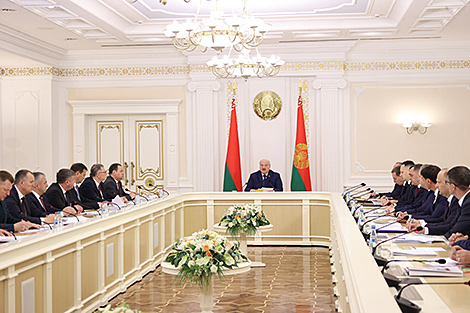
MINSK, 21 May (BelTA) – Improvement of control and oversight activities was in focus of the meeting hosted by Belarusian President Aleksandr Lukashenko on 21 May, BelTA has learned.
A draft decree providing for adjustments to regulatory legal acts in this field was discussed at the meeting. The head of state noted that this is not the first time this topic has been raised with the president, given its importance. In 2009, a comprehensive system of control was created in the country based on Decree No. 510. Eight years later, in 2017, it was comprehensively updated to stay current with the needs of the state and society. The list of oversight authorities has been revised, overlapping control activities have been reduced, and requirements for ordering inspections and for the work of inspectors have been tightened.
“As a result, according to the State Control Committee, the inspection burden on business entities is eased every year,” said Aleksandr Lukashenko.
According to the State Control Committee, the total number of inspections dropped by almost 30% in 2019-2023 (from 8,822 in 2019 to 6,500 in 2023).
“However, we need to admit that despite better statistics, some negative trends in this area persist,” the president noted. “In particular, full-fledged inspections are sometimes carried out under the guise of preventive forms of control like monitoring activities and technical inspections. All in all, 300,000 such activities are carried out in the country every year. You will agree, this is huge.”
“And only after I told you that this approach was unacceptable, the numbers dropped by about half,” the head of state noted.
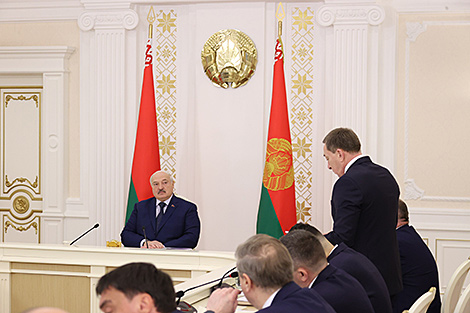
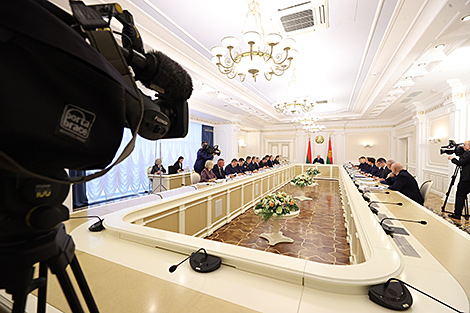
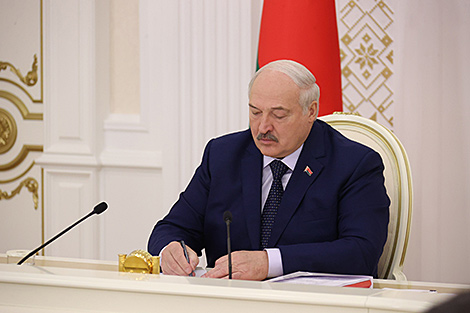
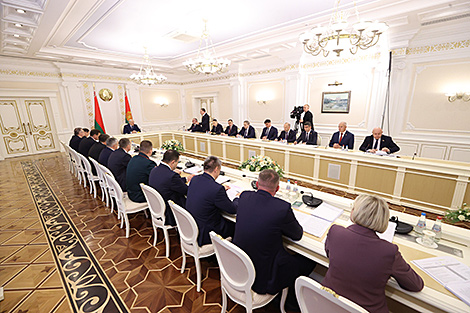
Yet, some enterprises continued to be inspected multiple times on the same grounds. “Inspectors, coming one after another, demand submitting a colossal amount of paperwork. In other words, what they do is red tape and nitpicking,” the head of state said pointing out to shortcomings. And he gave specific examples.
During the grain harvesting period in July - August 2022, inspectors visited the Osnezhitskoye company 49 times, though the performance of this farm in Pinsk District was average. Entries in the inspection book were made only twice. “According to the president’s aides and governors, these are not isolated incidents,” the president noted. Although the head of state admits that governors and company heads may just perceive the number of inspections as excessive, “but there is no smoke without fire,” noted Aleksandr Lukashenko.
“The most outrageous thing is that the organizations that need to be inspected are overlooked, while others get on inspectors' radar without due reason. Otherwise I would not have to intervene in order to sort things out, like with pricing,” said Aleksandr Lukashenko.
According to the head of state, inspectors are often bent on finding faults and imposing penalties, instead of helping companies improve their performance. “We don’t need fines or penalties or other sanctions, we need better performance of enterprises,” the head of state emphasized.
Previously, the president gave instructions to come to grips with the situation and change the style and methods of work. In pursuance of this, the government prepared a draft decree to improve control and oversight activities. The document took more than two years to draft. “The Belarus President Administration and the government have revised it several times, involving all interested parties. As a result, the document incorporates a number of changes, like a greater focus on preventive efforts by regulatory authorities and removing the prosecutor’s office from the scope of reference of Decree No. 510,” the head of state noted.
As this document is very important for the country, the president intends to make a final decision only after a comprehensive examination. Aleksandr Lukashenko addressed a number of questions to the participants of the meeting. In particular, he asked whether this document can help companies become more efficient, whether the number of inspections will decrease, and whether control will be eased. “I’m now talking about those cases where there is a real risk to jeopardize national security, life and health of citizens,” the head of state clarified.
The president asked whether the decree will be able to resolve all pending issues, and asked the Interdepartmental Council for Control and Oversight Activities what they think about this document.
“I want to make it clear once again: there should be no pressure on enterprises, organizations, business entities and people. We should not interfere with people’s work,” Aleksandr Lukashenko emphasized. “But if there are solid grounds to carry out inspections, such inspections should be held as often as necessary. Lamenting will not help. Control and law enforcement agencies should treat our enterprises as their children - they provide for us. Therefore, we must not interfere with their work. We should build an efficient system.”







 print version
print version make home page
make home page add to bookmarks
add to bookmarks

